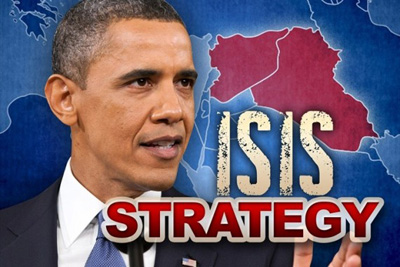Well, not exactly. But there is something interesting that Carly Fiorina says about budgeting for the federal government that might be helpful in reassessing the U.S.’s strategy on Syria.
Fiorina has called for “zero-based” budgeting. What that means is that everything is on the table. Her ideas can get very scary when applied to Social Security or Medicare, but in some cases they might make a little sense. If we apply zero-based budgeting to United States foreign policy towards the Middle East and Syria and Iraq in particular, it might help us find a strategy better than the one we are presently pursuing.
I’m reminded of the endless years that the United States remained in Vietnam, well past the time when it was clear that the U.S. was not going to “win” the war. Yet President Johnson and then President Nixon repeatedly said that those Americans who had died on the battlefields of Vietnam should not have “died in vain.” So what they did was to follow a policy resulted in more Americans dying on those same battlefields in vain. It didn’t make a whole lot of sense then and it doesn’t now.
So why is the United States still waging war in Syria and Iraq? Is it because that’s where we find ourselves now and to get out would mean that the policies that brought us there were a failure? To the degree that defending the past is guiding our current policy, we are trapped in a position of our own making and are too proud to change course. This has repeatedly not worked for the United States, nor for any other country. When rationalizing the past propels continuation of policies that simply are not working, the outcome is stagnation at best.
This is where the concept of zero-based budgeting comes in. Examine the present situation without either favoring or opposing the policies that brought you there. Take a look at the landscape with a fresh eye and reassess the problems that might exist through a lens that focuses on what your real goals are. Think about the historical forces that got you to the present situation. Consider who you want to help and who you consider to be your “enemy.” Reexamine the capabilities that you have to carry out any projected policy. Put every possible policy through a rigorous cost-benefit analysis. Consider possible collateral damage resulting from any steps, or non-steps that you might take.
In broad terms, let me suggest three significantly different approaches that President Obama and the United States could take toward Syria and Iraq:
- Get out. At least get out militarily. Until the last several centuries, and most particularly since the discovery of oil in the region, western countries have not paid that much attention to the Middle East. Perhaps it would be best to let internal forces compete for power in the region rather than intervention from other countries based on reasons that may have very little to do with the well-being of the people in the region.
- Go in full bore. Build a coalition of countries that are irritated by, are opposed to, and simply want to get rid of ISIL and similar organizations such as Al Qaeda. Send in hundreds of thousands of troops, perhaps millions, and combined with air strikes and a variety of sanctions, simply wipe out these organizations. Stay long enough so that you’re willing to play “whack-a-mole” and take out the last vestiges of these organizations. Once you have accomplished that, determine whether or not it’s wise to stay and engage in “nation-building” or better to simply leave. Keep in mind all the while how surviving citizens in these countries might regard the United States and other global power once the intervention is concluded.
- Stay the course. Continue doing what the United States is doing now. Do not abandon ship but at the same time do not grasp beyond your reach. Be confident that the current strategy will work if given enough time.
Obviously there is a myriad of other policies that the U.S. could take that are between the polarities of getting out and going in militarily without reservation. The bottom line is that whatever direction President Obama takes should be one that is based on clear goals and realistic strategies to carry them out. Justifying the past is not a good reason to do anything, particularly when the stakes are this high. Thank Carly Fiorina for unintentionally giving you the idea and wish her well in her return to corporate America. Be thankful that you won’t be working for her.
